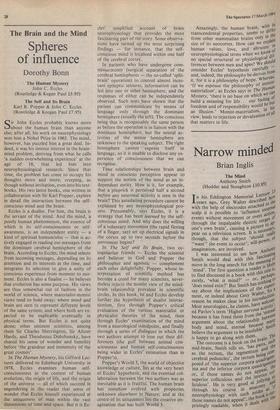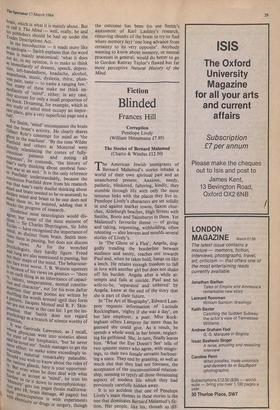Narrow minded
Brian Inglis
The Mind Anthony Smith Anthony Smith (Hodder and Stoughton £10.95) 15
In his Eddington Memorial Lecture • years ago, Grey Walter described 11°4 with the help of electrodes attached to scalp it is possible to 'influence extet events without movement or overt aetL",.,1 through the impalpable electric surges " one's own brain', causing a picture to ar pear on a television screen. It is neeesseV; though, that the subject `siloulci_rfr or "want" the event to occur';
imagination, are involved.
I was interested to see how AII—"s° OY Smith would deal with this fascitta.:-01 move in the long search for the meallu:'"ely `mind'. The first question a reader is lilt to find discussed in a book with this title Is, surely, 'what is mind?' — or, PerhaPEo `does mind exist?' But Smith has nothing n- say about the implications ofthe ere 0 ment, or indeed about Grey Walter f°.00. reason he makes clear in his introducti Most neurologists, he claims, have wele?tv" ed Pavlov's term 'Higher nervous actiorniaj because it has freed them from the eta argument about the relationship bet"„fty body and mind, eternal because ro_701 believe the argument to be insoluble'. SIP' is happy to go along with them. . The The outcome is a book on the braul'such mid-brain, Smith tells us, 'has Parts'A the as the tectum, the tegmenturn cerebral peduncles', the tectum be or posed of 'the superior corpora cluad, Ma and the inferior corpora qua the the or, if those names do not aPP( Col- superior colliculous and the inter:te liculous'. He is very good at lohY-00c1 through his course in anatoglYas ‘if neurophysiology with such asicles,, . 1s sar- those names do not appeal'; the bool`.,,, the prisingly readable, when it deals With brain, which is what it is mainly about. But to call it The Mind — well, really, he and his publishers should be had up under the Trades Descriptions Act. In the introduction — it reads more like an apologia — Smith explains that the word brain is mainly anatomical; 'what it does not do, in my opinion, is to make us think as immediately of dreams, speech, depres- sion, left-handedness, headache, alcohol, anaesthesia, music, dyslexia, thirst, phan- tam Pain, taste — to name a ranging few.' Not many of these make me think im- mediately of 'mind', either; in any case, they account for only a small proportion of the book. Dreaming, for example, which in any study of mind must occupy an impor- tant place, gets a very superficial page and a half For Smith, 'mind' encompasses the brain and the brain's activity. He clearly shares „rGilbert Ryle's contempt for mind ,as 'the sn,, ost in the machine'. 'By the time Wilder Penfield and others at Montreal were directly stimulating the cortex of fully- conscious patients and noting all Tresponses', he contends, 'the history of an's early thinking about cerebral func- "on Was at an end.' It is the only reference to Penfield; understandably, because the conclusion Penfield drew from his research was that man's early dualist thinking about Mind and brain needed to be re-assessed; to declare mind and brain to be one does not makes the so, he insisted, adding that it °lock the progress of research. boubtless most neurologists would dis- agree; but some of the most eminent of them i Sir Charles Sherrington, Sir John Eccles — have recognised the importance of ,.,., -"nri, as distinct from brain. Smith men- them in Passing, but does not discuss tneir views. As for the wretched PsYehologists, they hardly figure. Freud and Jung are also mentioned in passing, but fists their maps of the mind. The behaviour- is fare even worse,Watson squeezes :1_1 because of his views on genetics — 'there ,l' no such thing as an inheritance of capaci- !?, talents, temperament, mental constitu- tion and character', not for his even defter shuffling
that great poems are written by ,auffling the words around until they form
44n_Dattern. Jacques Monod and B. F. Skin- 1- are not even in the cast list. I get the im- ssin that Smith does not regard Ychology as a branch of science worthy of attention. ,,,,,,It was Gertrude Lawrence, as I recall, the Physician went into ecstatics about s■te, state of her lymphatics, 'but he never s'iu ue loved me'. Smith manages to get the Irkeffect: to make some exceedingly in- 4 table „ material remarkably palatable. tthe.o_vualuriruus wish to know about the roles of glands, here is your opportuni- rriY0 But even when he does deal with what h„_8_,t of us accept as 'mind', he tries his ,t;ireoest to tie it down to neurophysiology. tio,..M°rY' gets ten pages (brain malforma- theiurgets 18; brain damage, 40 pages); but with Preoccupation is with experiments
electricity or drugs or surgery, though
the outcome has been (to use Smith's assessment of Karl Lashley's research, removing chunks of the brain to try to find where memory lay) 'one long advance from certainty to its very opposite'. Anybody wanting to know about memory, or mental processes in general, would do better to go to Gordon Rattray Taylor's flawed but far more perceptive Natural History of the Mind.















































 Previous page
Previous page